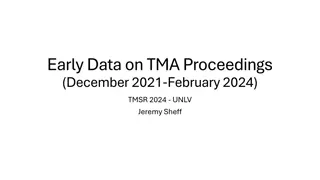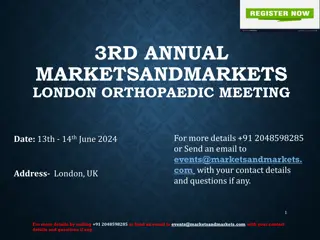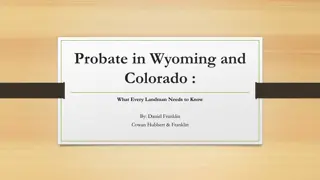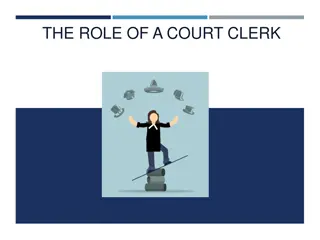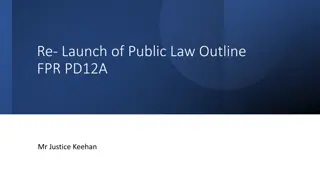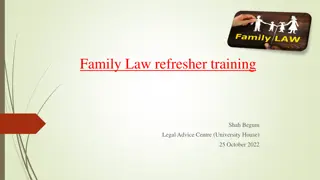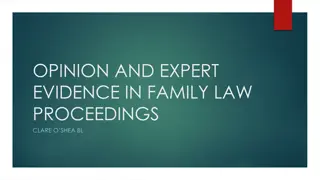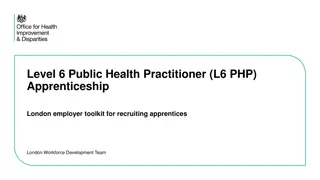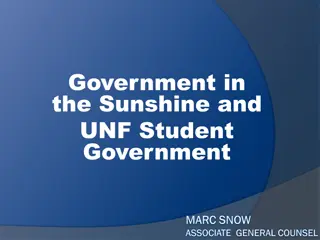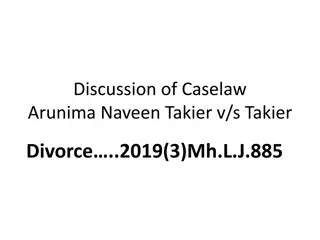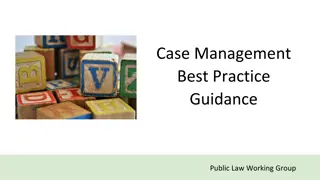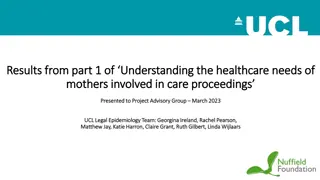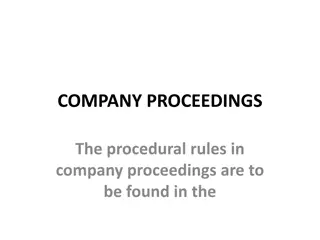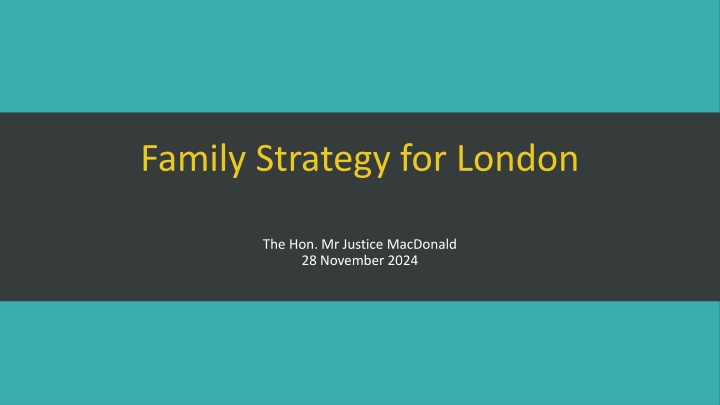
Family Strategy for London - Public Law Proceedings and Case Management
In public law proceedings under the Children Act 1989, adherence to the Family Procedure Rules 2010 is crucial. The court must follow a timetable to ensure timely resolution. The guidelines emphasize the importance of correct form submissions and fees. Policing urgency in applications and reducing hearings aim to streamline the judicial process. The focus is on preventing unnecessary reassessments and promoting efficiency.
Download Presentation

Please find below an Image/Link to download the presentation.
The content on the website is provided AS IS for your information and personal use only. It may not be sold, licensed, or shared on other websites without obtaining consent from the author. If you encounter any issues during the download, it is possible that the publisher has removed the file from their server.
You are allowed to download the files provided on this website for personal or commercial use, subject to the condition that they are used lawfully. All files are the property of their respective owners.
The content on the website is provided AS IS for your information and personal use only. It may not be sold, licensed, or shared on other websites without obtaining consent from the author.
E N D
Presentation Transcript
Family Strategy for London The Hon. Mr Justice MacDonald 28 November 2024
The Public Law Outline Section 32(1)(a) of the Children Act 1989requires the court to draw up a timetable with a view to determining public law proceedings without delay and, in any event, within 26 weeks. Part 12 of the Family Procedure Rules 2010 is a statutory code setting out the legal requirements for the case management of public law proceedings. PD12A is a self-contained code designed to assist the parties and the court to deal with care proceedings justly and efficiently. It is the law.
Adherence to the Rules FPR 2010 is the definitive procedural code. Any application within public law proceedings must be made using the correct court form and the correct fee paid. Applications must be made using FPL. No longer acceptable for applications for case management directions, or their variation, to be made by way of email to the court or judge. Emails requesting case management directions or variations thereto (including emails purporting to update the court and seeking guidance and emails duplicating applications submitted to FPL) will not be dealt with.
Policing Urgent Applications (Appendix 1) The courts will be rigorous in policing the question of urgency. Local authorities must give careful consideration to the scope of their powers under an interim care order before deciding to return the matter to court. The courts in London will adhere strictly to the local Practice Direction of 28 November 2024 on urgent hearings (Appendix I). Where an application is not, in fact, demonstrably urgent, the court will refuse to hear it as such. There must be evidence that the matter is urgent.
Making Cases Smaller Cases will be made smaller by reducing the number of hearings per case. Save where demonstrably necessary to deal with the case justly, cases will be limited to the three hearings provided for by the PLO. No other hearing should ordinarily be listed following the CMH until the Issues Resolution Hearing (IRH). The final hearing should not be listed prior to the completion of the IRH.
Stopping the Start Again Culture Adherence to the PLO pre-proceedings process is essential. There is little incentive for local authorities to conduct pre-proceedings assessments if the court orders further assessment as a matter of course. The assessment completed by the local authority during the pre- proceedings stage is sufficient to determine the issues before the court justly, the court will not order a further assessment unless it can be demonstrated that such further assessment is necessary. Ordinarily, the passage of time will not by itself justify a further assessment as being necessary.
Effective Case Management Hearings Proper adherence to the PLO requires a far greater focus on planning and preparation ahead of the CMH and the effective use of the Advocates Meeting. Under no circumstances should Advocates Meetings take place on the working day before the hearing. Practice Direction documents, including a draft order, must be submitted to the court in accordance with the time limits set out in the PLO. Pressure of work on the part of the advocate and/or solicitor will not be an excuse for failure to submit Practice Direction paperwork by the deadline stipulated. The task of the court at a CMH is to ensure the Overriding Objective in FPR 2010 r.1.1 is being met and to determine any case management issues that are in dispute between the parties. The court is not assisted at the CMH by advocates reciting lists of general concerns to the court in the hope that the court will make some comment helpful to their client. Advocates should make clear at the outset of the CMH what case management orders are sought and, in particular, whether there is a dispute as to which orders should be made.
Immigration Issues and Foreign Placements London has a high proportion of cases involving jurisdictional and immigration issues and proposed placements abroad. Consideration of the legal and practical issues arising must start prior to the CMH and be considered at the advocate s meeting. The parties must at the Advocate's Meeting, and the court must at the CMH, identify any issues arising and give further directions for securing the evidence or expert opinion required to address them. The court must at the CMH identify any issues arising and give directions for securing the evidence or expert opinion required to address those issues. It is not acceptable for issues regarding immigration status to be left to be investigated at the IRH or final hearing and wholly unacceptable for them to be left unresolved at the point a final order is made.
Limiting Expert Evidence The strict test for whether the court requires expert evidence to determine proceedings is clear and well established. The court will only permit the instruction of an expert where it is demonstrated to the court that to do so is necessary . The fact that all parties agree that a particular expert is necessary will not automatically lead to permission being given for that expert to be instructed. FPR 2010 r.25.10 provides a comprehensive framework for written questions to be put to expert witnesses. FPR 2010 r.25.9(2) stipulates that the court will not direct the attendance of the expert at a final hearing unless it is necessary. By reference to the terms of FPR 2010 r.25.9, a direction for the attendance of the expert at the final hearing will be an exceptional course.
Effective Issues Resolution Hearings The task of the court at the IRH is to resolve and narrow issues, with a view to determining the proceedings at the IRH. The IRH is not a pre-trial review. It is essential that at the IRH the court: Identifies the key issues (if any) to be determined; Considers whether the IRH can be used as a final hearing; and resolves or narrows the issues by hearing evidence. Only where issues remain will the court move to determine the scope of the final hearing and give case management directions.
Proper Statutory Scope The court does not need to determine every issue between the parties at IRH or final hearing and must not be asked to do so. By reference to the express terms of s.31 of the Children Act 1989, the court will limit its consideration to the following issues: whether the s 31 threshold criteria are satisfied; if so, consideration of the nature of the permanence provisions in the care plan; the arrangements for contact; and what order, having regarding to s.1 of the Children Act 1989, should be made. By way of example, ordinarily, it is no part of the court s task to provide a narrative for the child by making findings of fact where those findings are not required in order to determine the case.
Attendance The advantages of attended hearings, where all parties are present at court to engage in discussion and robust case management are well established. The court will continue to have a discretion, exceptionally, to list the CMH as a remote hearing in an appropriate case. The IRH and any Final Hearing will always proceed as an attended hearing and trial advocates must attend the IRH. Any application for a CMH that has been listed as an attended hearing to instead be conducted remotely, or for one or more parties to attend remotely, must be made by C2 application and a fee paid. Requests for remote attendance made by email will not be accepted and will not be dealt with. The Children s Guardian must attend the IRH.
Controlling Intermediaries Intermediaries should only be appointed by the court where there is a compelling reason to do so and not simply because the process would be improved or made easier. It will be exceptionally rare for the court to appoint an intermediary for the whole final hearing. All advocates should be familiar with the Advocates Gateway and the advice on how to help vulnerable parties and witnesses understand and participate in the proceedings. An expert recommendation for an intermediary is not determinative. It will be unusual for the case to be adjourned for a lack of intermediary
Default Pursuant to FPR 2010 r 4.5(3), the time limits specified in a case management order may not be extended by agreement between the parties. The court will not simply accept a consent order lodged by the parties seeking to re- timetable proceedings. It remains the duty of all parties to bring to the attention of the court any default with respect to the case management timetable and to make an application for relief from sanctions prior to the default taking place. Where a hearing is rendered ineffective due to a failure by a party or parties to make a timely application for relief from sanction prior to default, the court may give consideration to making a costs order or disallowing the fees of solicitors and/or counsel. Non-compliance with case management orders may be regarded by the court as professional misconduct (Re W (A Child)(Adoption Order: Leave to Oppose); Re H (A Child)(Adoption Order)(Leave to Oppose) [2013] EWCA Civ 1177, [2014] 1 FLR 1266).
Family Strategy for London The Hon. Mr Justice MacDonald 28 November 2024

